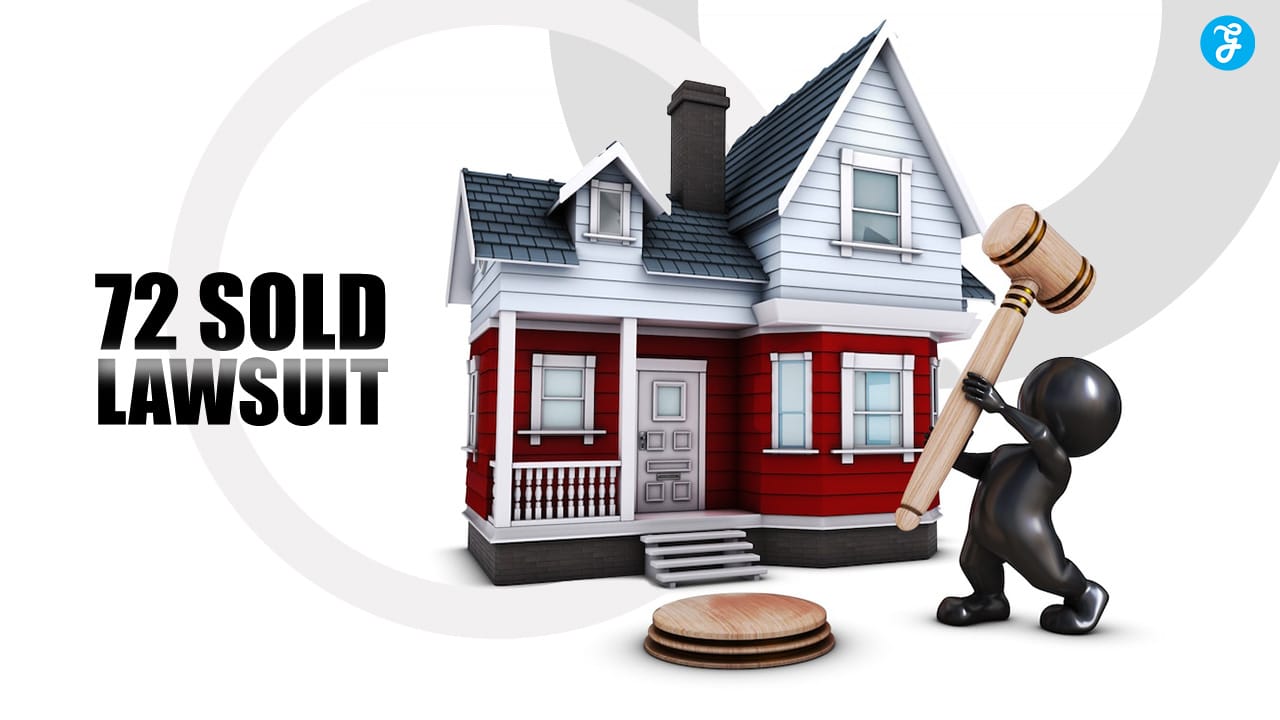Buying or selling a home is a big step. You want it to go smoothly. But sometimes, companies make promises they can’t keep. This can leave homeowners feeling tricked and upset. One such case has come up with the 72 Sold lawsuit.
This lawsuit claims that 72 Sold used false advertising and put pressure on homeowners. They didn’t tell them about extra costs either. Our article looks into these allegations and what they could mean for people involved.
It will offer advice for anyone thinking of selling their home this way.
Read on to find out more!
Overview of the 72 Sold Lawsuit
The 72 Sold lawsuit started with unhappy homeowners. They said 72 Sold used false ads and charged secret costs.
Origin of the Lawsuit
The lawsuit against 72 Sold started in mid-2023. Greg Hague, who founded the company, now faces legal trouble. This company works with Keller Williams brokerage to sell homes quickly.
People got upset and sued them for not being honest.
They said 72 Sold made promises they didn’t keep. The lawsuit points out problems like misleading ads and hidden fees. This big mess began because people felt tricked after trying to sell their homes fast using 72 Sold’s service.
Key Allegations Against 72 Sold
72 Sold faces serious claims. People say the company lied about how it sells homes. They promised quick sales and high prices but did not deliver. Homes sold for less than owners hoped, causing money problems.
The company also hid extra costs that they didn’t tell homeowners about upfront. These actions have led to big trouble for 72 Sold, stirring up legal battles and making people question their trust in the real estate market.
Detailed Examination of Legal Claims
We look closely at what people say 72 Sold did wrong. This part checks if their ads were clear, if they told all about the fees, and if they were too pushy with house sellers.
Misleading Advertising Practices
72 Sold faces claims of misleading ads. They told people they could sell homes in 72 hours. This promise may not be true for everyone. Ads like these can make homeowners expect too much.
They might think their home will sell fast and for a good price, but this might not happen.
The lawsuit says 72 Sold broke trust with false ads. This is serious because it deals with where people live. False advertising makes problems for homeowners and the company. It breaks rules about being honest in business practices.
Hidden Fees and Undisclosed Costs
Clients of 72 Sold faced unexpected costs. These hidden fees made the deals less clear. People thought they were getting one price, but paid more in the end. This lack of openness hurt trust.
Some costs were not told to sellers upfront. This changed how much money they got from their sales. Finding out about these extra charges later upset many people. They felt tricked and lost faith in the process.
Pressure Tactics on Homeowners
Some companies use hard sells on homeowners. They make you feel like you must decide fast. This causes stress and worry. Homeowners might not see all their options because of the rush.
These tactics can lead to bad choices. People may sell homes for less money or pay high fees they didn’t know about. This is not fair or right.
The Company’s Defense
72 Sold’s legal team is gearing up to fight the lawsuit. They plan to use evidence and past client feedback to show their side of the story.
Responses from 72 Sold Legal Team
The legal team at 72 Sold reacted quickly to the lawsuit. They said they did nothing wrong. The team stressed their focus on being clear with customers and making sure they are happy.
They believe in their business model and how it helps people sell homes fast.
They also shared plans to fight the claims in court. Their defense will show that their ads were not misleading and fees were clear from the start. They want to keep a good name by proving they treat homeowners fairly.
Strategies Employed by the Defense
72 Sold’s legal team fights back with clear strategies. They focus on ethical practices and look for peaceful solutions. Their main goal is to clear the company’s name by showing they follow the law.
They talk to consumer protection agencies and regulatory bodies. This shows they want to fix any problems.
They also use data to prove their point. The defense shows numbers on customer satisfaction and how their business meets industry standards. This helps them argue against claims of misleading advertising and hidden fees.
Their approach aims to show 72 Sold as a fair and open company in real estate marketing.
Implications for Homeowners
Homeowners facing this case might lose money or face troubles if 72 Sold broke the law. They should look into other ways to sell their homes safely and smartly.
Potential Outcomes for Affected Homeowners
Some homeowners might get money back or have their fees cut. The court could say 72 Sold has to pay fines and give compensation. This means people who lost money because of high costs they didn’t know about could get some relief.
They might see less financial strain.
The lawsuit outcome may also change how 72 Sold works with house sellers in the future. If the company must follow new rules, selling houses could become more open and fair. People thinking about selling homes this way will want to watch what happens closely.
This case shows the importance of clear details and fair deals in selling homes fast.
Recommendations for Homeowners Considering Similar Programs
Looking into home selling programs can be tricky. It’s key to know what to watch for and how to stay safe. Here’s what you should do:
- Do your homework on the company. Check out reviews and talk to past clients.
- Read all the fine print in any contract. This helps avoid hidden fees.
- Ask about all the costs upfront. No surprises are good.
- Look for clear, honest ads. Ads should match what the company really does.
- Be wary of big promises, like selling fast or at a high price.
- Talk to a real estate agent too. They give another view on your home’s value.
- Know your rights under consumer protection laws.
- If something feels off, ask questions until you’re happy with the answers.
- Plan for different market conditions that could affect your sale.
- Check if there’s pressure to sign up fast—good deals will still be there after you think it over.
Staying careful and asking lots of questions is smart when looking into these programs.
Impact on the Real Estate Industry
The lawsuit against 72 Sold could shake up the whole real estate world. It might make lawmakers look closer at how homes are sold and change rules for online property platforms.
Potential Regulatory Changes
Rules might change after the 72 Sold lawsuit. These changes could make selling homes faster with real estate technology platforms more watched by rules. They want to stop misleading ads and hidden fees.
This is to protect homeowners. The National Association of Realtors might ask for new laws. These laws would make sure companies tell the truth about how fast they sell houses and their costs.
More checks on these companies could happen, too. This means groups that watch over real estate will look more closely at how these platforms work. They want to make sure no one is lying or hiding things from people trying to sell their homes quickly.
If a company does this, it could get in big trouble, like paying fines or having to change how it does business.
Increased Scrutiny of Real Estate Technology Platforms
Real estate tech platforms are facing more checks now. State and federal consumer protection groups are stepping up. They want to make sure these companies play fair. This means checking if they tell the truth about how fast homes sell or what fees buyers should expect.
This closer look is due to concerns over things like deceptive marketing and hidden costs. It aims at making the real estate market better for everyone. By doing so, it ensures that home sellers do not fall into traps set by misleading ads or pressure tactics.
Future Implications
The lawsuit against 72 Sold could change how we sell houses in the future. It might lead to new rules for everyone in real estate.
What This Lawsuit Could Mean for 72 Sold
This lawsuit may force 72 Sold to change how it does business. If they lose, they might have to be more honest in their ads and tell customers about all costs upfront. This is important for keeping trust with buyers and sellers.
The company could also see changes in its business model to follow new rules better. Investors will watch closely; their support depends on the company’s ethics.
Facing legal troubles can hurt a company’s name. People might start doubting if they should use 72 Sold’s services. This doubt can lead to fewer sales and less money made by the company.
To stay strong, 72 Sold will need to show everyone that it can fix these problems and improve how it treats customers.
Broader Implications for the Industry
The 72 Sold lawsuit may change marketing in real estate. Firms might have to be clearer about their ads and fees. This case shows the need for careful actions and open talking with buyers.
It could lead to more rules on how homes are sold.
Real estate tech platforms may face more checks. They will need to follow new rules closely. This could help build trust with customers. Overall, this lawsuit reminds everyone in real estate to focus on fair deals and clear information.
Takeaways
The 72 Sold lawsuit shines a light on big issues in real estate. It’s about truth in ads and fair deals for home sellers. This case may change how homes sell in the future. It shows buyers and sellers to always check the facts.
Everyone in real estate can learn from this.







































